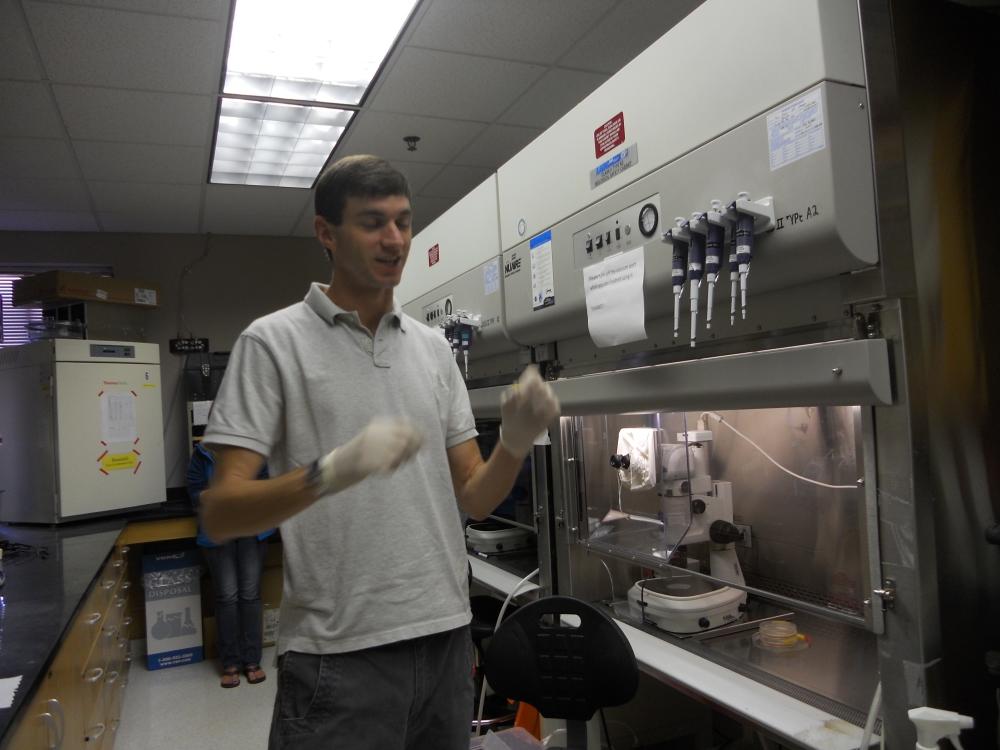
Section Branding
Header Content
Innovation On The Rise In Georgia
Primary Content

Georgia lost more than 300,000 jobs during the Great Recession. And many companies have gone belly up. But, that doesn’t mean innovation has dried up or cutting edge companies have stopped forming in Georgia.
It’s a sunny fall morning at the University of Georgia in Athens and biology graduate student Raymond Swetenberg is hunched over his workspace.
But he’s not in the library or at a campus job. He’s deep in a lab filled with industrial refrigerators and bio equipment, doing research for Aruna Biomedical. It’s a company founded by his professor, Steven Stice.
Wearing latex gloves and peering through a microscope, Swetenberg is examining stem cells submerged in formaldehyde.
“I’m doing what we call fixing cells in formaldehyde,” he said. “Kind of like you think of old organs in old scientists’ labs that are stuck in formaldehyde. It’s kind of like putting the cells in suspended animation. Then we can examine them a little better.”
Aruna develops stem cells that companies use to find cures for diseases. Pfizer, the pharmaceutical giant, for example, is using them for a treatment for Alzheimers’.
Stice says that means Aruna is converting research conducted at UGA into a tangible product to sell.
“That’s why I came to the University of Georgia 14 years ago….is to be able to move technology from my academic lab and commercialize it through companies started here in Georgia,” he said.
And that type of transaction pays dividends for Georgia’s economy by boosting employment.
“Aruna has licensed technology from the University of Georgia to commercialize it here in Georgia, creating jobs through that,” he said.
Aruna resides in UGA’s BioBusiness Center and is among the dozens of startup companies arising from research done at state universities.
The center is part of a network of spaces around the state that are known as business incubators because they nurture young companies.
Another company at UGA, Pathens Inc., is developing a new way to give a vaccine for tuberculosis. Instead of injecting it, you inhale it.
Fred Quinn, a UGA biology professor and the company’s founder, says it solves a crucial problem for healthcare professionals, especially in areas where most of the two billion cases of tuberculosis are.
“When you’re in rural Africa or Asia, it’s difficult to trek in a thousand needles to inject kids and adults,” he said.
But startups blazing new fields are not the only place where innovation is occurring. The state also has facilities where older companies can re-invent themselves.
One such space is Georgia Tech’s Manufacturing Institute. On a recent afternoon, Stephen Sheffield showed off equipment that creates manufacturing prototypes.
He’s built models for Caterpillar, John Deere and Boeing on projects. And that’s in part because of something many predicted would never happen.
“Manufacturing is coming back, and a lot of companies are coming to us with an interest,” he said.
Indeed what Georgia Tech officials hope will be a ‘manufacturing renaissance’ here and beyond is driving innovation.
Sheffield helps clients sharpen their competitive edge.
“There are a lot of smaller companies that have new ideas,” he said. “And they’re finding out that if we can improve some of these things, we know can beat some foreign competition and we can bring some work back. And that’s pretty innovative.”
Back at UGA, Swetenburg, the grad student, continues his work. And professor Stice says he’ll help Aruna answer a fundamental question about biology.
“What Raymond’s doing is really trying to figure out is why things happen the way they do,” he said.
And answering that question will help Aruna find more customers, sell more stem cells, and employ more people. And that’s what it’s all about.
Tags: University of Georgia, BioBusiness Center, Aruna Biomedical, Pathens Inc, Georgia Tech Manufacturing Institute, commercialization
